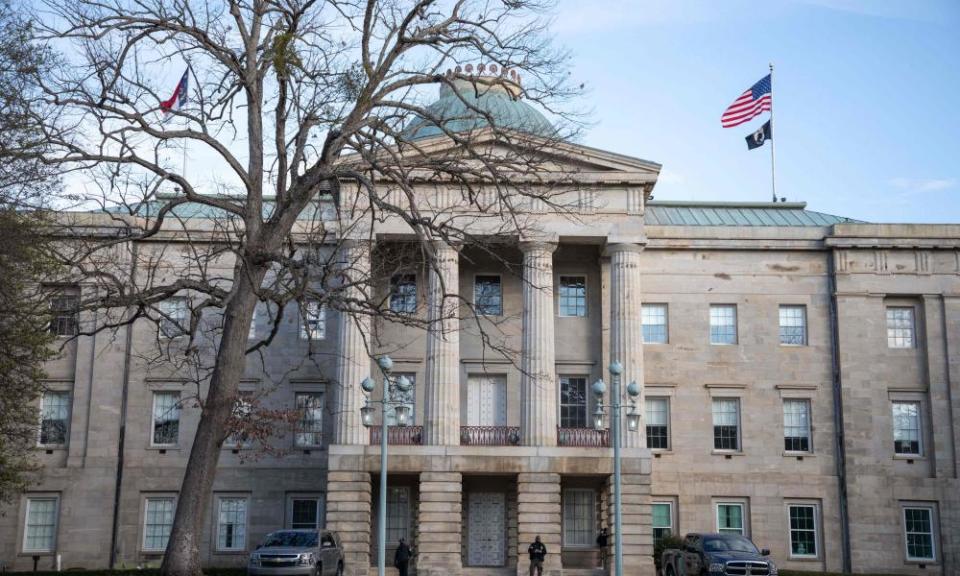US supreme court case could give state politicians huge power over elections

The US supreme court agreed on Thursday to hear a case that could dramatically upend the fight over voting in America and give state lawmakers enormous power in setting rules for elections to federal office.
The case, Moore v Harper, asks the supreme court to endorse the “independent state legislature theory” – the idea that state legislatures have exclusive authority to set the rules for federal elections. Republicans have complete control of government in 23 states, and have used redistricting to lock in their advantage for the next decade in many places.
The dispute involves a challenge to North Carolina’s congressional map. Earlier this year, the state supreme court struck down the map passed by the state’s Republican-controlled legislature for being so gerrymandered that it violated the state’s constitution. When the legislature did not come up with a constitutionally compliant new plan, the court imposed one drawn by a special master.
That was illegal, lawyers representing the general assembly argued in their petition to the US supreme court. The elections clause in the US constitution says that state legislatures shall set the “The Times, Places and Manner” for federal elections. The state supreme court, the lawyers said, does not have the power to set the rules for congressional elections.
Related: Republican push to recruit election deniers as poll workers causes alarm
“The question presented here goes to the very core of this nation’s democratic republic: what entity has the constitutional authority to set the rules of the road for federal elections, the means we use to 'exercise self-government’,” the lawyers wrote in their brief to the supreme court.
The case could have profound implications for voting rights. State courts in recent years have been increasingly active in disputes around partisan gerrymandering, the practice of distorting district lines to guarantee election outcomes. Courts in Pennsylvania, North Carolina, Ohio and New York have all played a key role in recent year in reining in excessive partisan gerrymandering. They have become increasingly active, in part, because the US supreme court said in 2019 that federal courts could not address partisan gerrymandering, but that state courts could use state constitutions to police it.
The impact could also extend far beyond gerrymandering. State supreme courts in recent years have been called on to weigh in on a range of rules for elections, such as mail-in voting laws and identification requirements.
A ruling in favor of state legislatures could also make it easier for officials to subvert an election and reject a result favoring the other party, Richard Hasen, a law professor at the University of California, Los Angeles, wrote in a blogpost.
“Suppose a state agency interprets state rules to allow for the counting of certain ballots, and doing so favors one candidate,” he wrote. “If the leaders of the legislature are from the other party, and they say that the interpretation does not follow the views of the legislature, it’s impermissible and the results need to flip.”
Giving state lawmakers virtually uncheckable authority to set election rules would upend nearly a century of law, lawyers representing the challengers in the case wrote in a brief to the court.
“Applicants’ unsupported theory to the contrary – that the Elections Clause bars a state court from hearing a state constitutional challenge to any law regulating federal elections, including a congressional plan – runs headlong into at least half a dozen of this Court’s decisions, federal statutes, another provision of the US Constitution, and numerous North Carolina statutory and constitutional provisions,” they wrote.
“It is also repugnant to the sovereignty of states, the authority of state constitutions, and the independence of state courts, and would produce absurd consequences,” they added.
Allison Riggs, a lawyer at the Southern Coalition for Social Justice representing some of the challengers in the case said the independent state legislature theory was “a fringe, desperate and anti-democratic attack by a gerrymandered legislature”.
Even if the court is eager to weigh in on the doctrine, lawyers representing the challenger pointed out that the North Carolina case was a bad case on which to do so. State law explicitly lays out a process for state courts to review redistricting plans.
In 2015, the court considered a similar case, ruling 5-4 that the elections clause did not preclude voters from using a voter referendum in Arizona to create an independent commission with control over redistricting. Chief Justice John Roberts was in the minority in that case and wrote a sharply worded dissent.
But the composition of the court has changed significantly since then. Several of the conservative justices have already indicated they are eager to embrace the idea of limited court action.
“If the language of the Elections Clause is taken seriously, there must be some limit on the authority of state courts to countermand actions taken by state legislatures when they are prescribing rules for the conduct of federal elections,” Justice Samuel Alito wrote earlier this year, joined by Neil Gorsuch, dissenting from a procedural ruling not to block North Carolina’s map from going into effect. “I think it is likely that the applicants would succeed in showing that the North Carolina Supreme Court exceeded those limits.”
Justice Clarence Thomas had previously said the court’s refusal to consider the question was “baffling”. Justice Brett Kavanaugh called the independent state legislature question “extraordinarily important”.

 money
money 